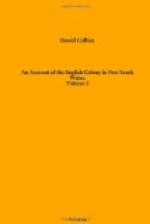One moment’s reflection on the vices that prevailed in the colony will be sufficient to excite a wish, that some institution could have been devised for separating the greater part of these (at present, innocent) members of the community from their vicious parents, where they could have been educated at the public expense, their propensities to evil corrected, and that turn given to their attainments which should secure them a stock of useful knowledge. An arrangement of this nature was every day becoming more necessary; for there were not less than 300 young people at this time in the town of Sydney, none of whom, with the exception of a very few, had been born in England.
On the eve of Christmas Day two young men, settlers on some land midway between Sydney and Parramatta, having been boasting of their respective abilities in drinking, regardless of the solemnity of the time, challenged each other to a trial of their skill; on which they were so deliberately bent, that, to prevent their being interrupted, they retired to the skirts of a neighbouring wood, with a quantity of raw spirits which they had provided for the purpose. Their abilities, however, were not equal to their boasting; for one of them died upon the spot, and the life of the other was fast ebbing when he was taken up. Had another hour elapsed, he too must have perished, like his wretched companion. They had not been able to finish all the pernicious spirit which they had prepared, some of it remaining by them in a case bottle when they were found.
On the morning of Christmas Day, the governor was informed that two seamen belonging to the Reliance had discovered the body of a soldier (who had been for two days missing from the look-out post on the South Head, where he was on duty), lying in a mangled state, the head and hands being cut off. Some words having passed between him and a soldier, who had been also heard to threaten him, he was suspected of having committed the murder, and on the 30th was put on his trial for the same. Nothing, however, appeared before the court that could substantiate the charge of murder against him; neither was it clearly ascertained that violent hands had been laid on the deceased. As it had been foreseen that direct proof would be wanting, it was deemed expedient to obtain what might be, though not positive, yet of a nature to be nearly as satisfactory. With this view, the suspected person was directed to handle and bury the body, which he did without any apparent emotion; nor did the body bleed at his touch, or exhibit any sign that superstition or ignorance could turn into an accusation against him; he observing at the same time, that, as he had never had any quarrel with the deceased, he could have no objection to perform this last friendly office for him.
At this court a settler was fined the sum of 40 shillings, and ordered to labour for six weeks, being convicted of disobeying the public orders of the colony.




